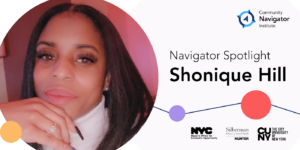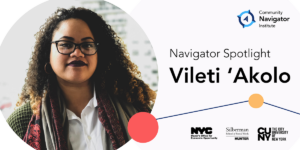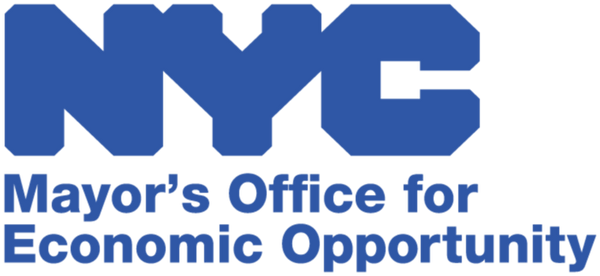The Navigator series spotlights staff in community-based organizations and mentors within peer workforce social service models. For our first feature, we are centering the work of Vileti ‘Akolo, one of the facilitators leading the Community Navigator Institute.
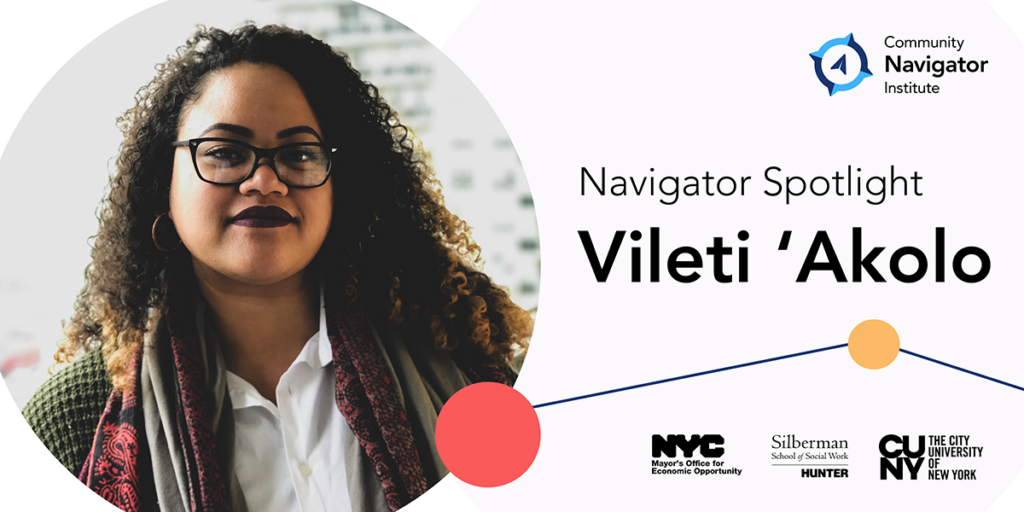
“Working in El Barrio and alongside the people of East Harlem has taught me to always trust the voices and experiences of the people who’ve lived here for generations, who’ve contributed to weaving El Barrio into the community it is today.” Vileti ‘Akolo, Social Work Supervisor of the Community Navigator Institute
Tell us a little about yourself. What’s your current role? How long have you been working with the Community Navigator Program?
Hey y’all! I am Vileti ‘Akolo, I use she/they pronouns, and I am a first-generation Tongan trauma-informed licensed social worker, psychotherapist, restorative justice circle keeper, and consultant who focuses on staff development and workplace culture. My social work career spans over a decade of service in family/intimate partner/gender-based and teen dating violence, public and charter school education, re-entry and alternatives to incarceration programming, trauma-responsive care and community-based organizations. My current role is Facilitator with the Community Navigator Institute, formerly known as the Community Navigator Program. I became a part of the former Community Navigator Program in 2019 as a Social Work Supervisor responsible for supervising, coaching, and developing staff and social work interns, while cultivating community partnerships with the local East Harlem and neighboring uptown communities and social service providers.
How has your experience with the Community Navigator Institute been? Can you reflect a little on Cohort 1? What are your hopes for the next two cohorts?
I’ve really enjoyed showcasing our program’s framework and co-creating with the team the lessons learned and best practices of social service models that we found integral and complementary to our work. We kicked off the Institute in early July by introducing the original and evolved approaches to case navigation. We went on to highlight our holistic approaches to social work supervision, intern & staff coaching and professional development, and concluded the cohort featuring the rich history of Asset-Based Community Development, the deep value of community engagement and the importance of storytelling through data tracking. My hope for the next two cohorts is that more folks who are doing the ‘on the ground’ work are aware of these offerings and are able to attend and engage in our upcoming workshop series.
What initially sparked your interest in service navigation?
I am a child of elderly immigrants and was raised in a household and larger insular Tongan community where acknowledging that help was needed and seeking ‘outside help’ from the modern Western world for any type of systems support was discouraged and frowned upon. While I appreciate and honor the long-lasting examples of cultural mutual aid that has sustained the Tongan diasporic community for generations, I also know the transformation that can happen when relationship building between community organizations and the local neighborhood are prioritized. When these types of connections are fostered, it allows the local community to feel safe and brave enough to seek help, disclose their life challenges and what their family’s needs are in order to thrive.
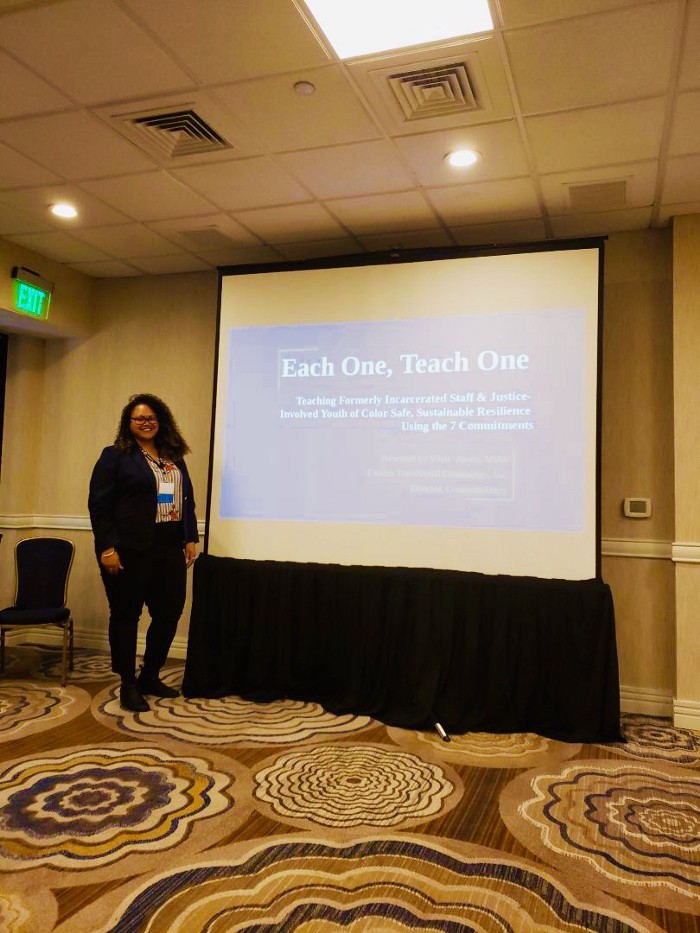
Can you talk a little more about your philosophy in service work? What values do you hold and how do you integrate these into your practice?
My philosophy in service work is grounded in teachings by Black feminist activists and writers like bell hooks, Audre Lorde, Toni Morrison and Octavia Butler, to name a few, as well as my own indigenous Tongan cultural values and traditions. I believe the people and communities seeking support should always be centered and the focus in service work. Honoring, uplifting and seeing the value in their lived experiences through co-collaboration needs to be paramount in our approach to providing support services. This can look many different ways. I integrate my values into my practice through intentional relationship building, moving at the speed of trust, practicing vulnerability and modeling boundaries with colleagues and staff. I do my best to be transparent and show up as my most authentic self. When I am able to show up in these ways, I’ve noticed it allows others to embrace their own uniqueness and show up as they are, ready to share their gifts with others.
What are some misconceptions about social service navigation?
One misconception about social service navigation stems from having unrealistic expectations of the service provider and what they can actually accomplish within their own professional capacity and scope of work. Sometimes social service navigation can feel extremely daunting and dissatisfying for both the worker and person in need because of the many layers and sometimes barriers they have to traverse in order to link the community member to various resources. Another misconception is that all needs will be met within a certain timeframe. The intention is always to connect the person in need to services within a timely manner, and on the other hand, we know systems work can take much longer than expected for many reasons outside our control.
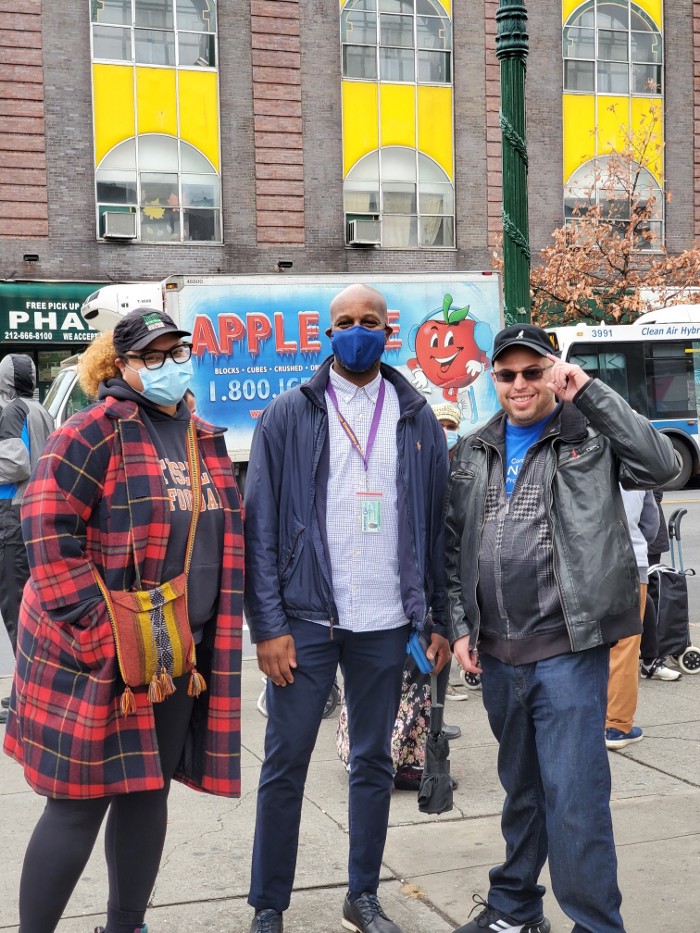
What has your experience been like working in East Harlem? What are things you have learned from being in the community?
I would describe my personal experience of working in East Harlem as serendipitously divine. I attended Silberman School of Social Work at Hunter College which is located in El Barrio, and since I graduated from my Master’s program in 2014 I’ve found myself working for organizations also located within this culturally rich community. I’ve yet to leave this community. Working in El Barrio and alongside the people of East Harlem has taught me to always trust the voices and experiences of the people who’ve lived here for generations, who’ve contributed to weaving El Barrio into the community it is today. El Barrio is a community that is doing its best to thrive in the face of gentrification, corruption, drug addiction and gun violence, and working here has taught me to always center community, rely on community and connection building, because that is what will always lead us and sustain us in being able to do this work.
“I believe the people and communities seeking support should always be centered and the focus in service work. Honoring, uplifting and seeing the value in their lived experiences through co-collaboration needs to be paramount in our approach to providing support services.”
– Vileti ‘Akolo, Social Work Supervisor of the Community Navigator Institute
Can you speak to the value of lived experience in social service navigation? What advice would you give to people who are interested in leveraging their lived experience to get into social service navigation?
Lived experience in social service navigation is the factor you didn’t know you needed until you see how transformative and impactful it is to the ins and outs of the work. Receiving social service support from someone who has had to trod down similar paths as you has shown to put people at ease and feel more comfortable being vulnerable about their challenges. It dissipates fear and shame and allows for compassion and empathy to guide the work. My advice to anyone interested in leveraging their lived experience to get into social service navigation is to be both aware that your story can change someone’s life, AND, it might not always resonate with where others are at in their life and to not take it personal, but to know that you carry your story with you and however you share your story with others is worthy and enough in and of itself.
What has it been like to work alongside the Mayor’s Office for Economic Opportunity’s Service Design Studio?
It has been a breath of fresh air and has felt very supportive and collaborative working with the Mayor’s Office for Economic Opportunity’s Service Design Studio. They have been extremely helpful every step of the way, listening to our concerns, asking for our feedback as we create structures and build out the Institute. I feel like we are genuinely integrating our strengths on both ends of this partnership and it has felt really affirming to witness the mutual trust and transparency unfold as we continue working together.
About the Navigator Spotlight Series
The Navigator series spotlights staff in community-based organizations, credible messengers, and mentors within peer workforce social service models. These individuals inspire us to think expansively about city services and the vital work happening within communities to connect people to services, programs, and supports.


